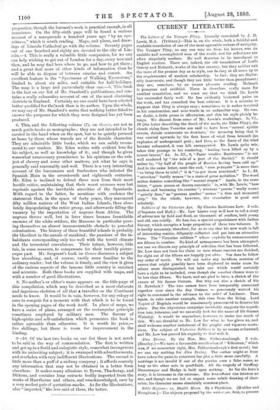CURRENT LITERATURE.
The Letters of the Younger Pliny. Literally translated by J. D. Lewis, M.A. (Trilbner.)—This is, on the whole, both a faithful and readable translation of one of the most agreeable writers of antiquity. The Younger Pliny, as any one may see from his letters, was an amiable and accomplished man of the world, and his reflections are often singularly modern. He well deserves to be introduced to English readers. There are, indeed, the old translations of Lords Orrery and Melmoth, works of the last century, but they neither suit the taste of the present day as to style, nor do they at all come up to the requirements of modern scholarship. In fact, they are deplor- ably inaccurate, and though they are little better than paraphrases ; they are, somehow, by no means pleasant reading. Melmoth is pompous and artificial. There is, therefore, really room for another translation, and we must say that we think Mr. Lewis has succeeded fairly well. He has evidently bestowed pains on the work, and has consulted the beat editions. It is a mistake to suppose that Pliny is always easy ; sometimes he is rather involved in his construction, and uses words in an unfamiliar way. He was, no doubt, a little prone to affectation, and this his style plainly be- trays. We dissent from some of Mr. Lewis's renderings. In VI., 16 (the letter describing the death of the uncle, the Elder Pliny), the clouds rising from Vesuvius are said to have been "recenti spiritu evecta, deinde senescente eo destituta,' the meaning being that it was carried upwards by the first burst of wind from beneath (au explosion of underground gas) ; and then, as the force of the wind became exhausted, it was left unsupported. Mr. Lewis quite mis- takes this passage in his rendering, "having been lifted up by a recent breeze," &c. In III., 9, " Parte vendita Baeticortnn " is not well rendered by "the sale of a part of the Baetici." It should rather be, "by half of the people of Baetica having been sold up." And in the same letter, near the end, " reos peragere " is more than "to bring them to trial ;" it is "to get them convicted." In I., 22, " attonitus" hardly means" in a state of great agitation." The word rather denotes something like "mental stupor." Again, in the same letter, "quern pressa et decora cunctatio is, with Mr. Lewis, "how modest and becoming his caution "; whereas "pressa" really meats "quietly firm," as "pressus gradus " means a firm and measured step." On the whole, however, the translation is good and scholarly.






























 Previous page
Previous page